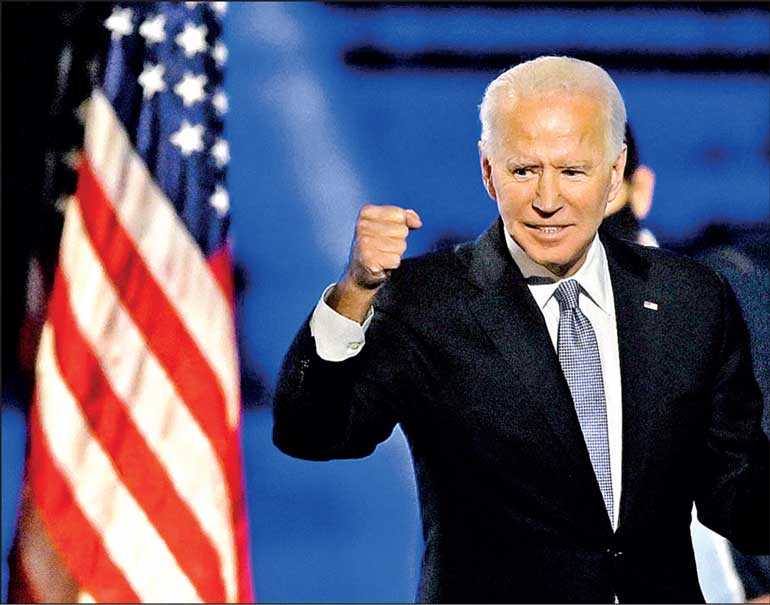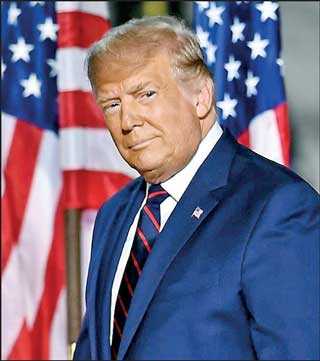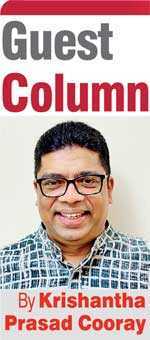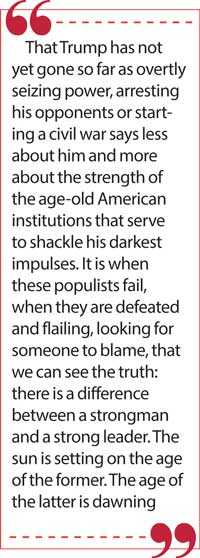Tuesday Feb 17, 2026
Tuesday Feb 17, 2026
Wednesday, 18 November 2020 00:00 - - {{hitsCtrl.values.hits}}

If Joe Biden is successful in healing his country and repairing its frayed international alliances, it will help weaken the lure of populist leaders globally. A Biden-Harris America has the potential of proving to the world’s people that that true strength is not measured by egoistic blustering or lawlessness but by intelligence, competence and compassion
 |
| With Trump gone, rubber-stamping of human rights violations and crimes against humanity might become a thing of the past. In the last four years, autocrats knew they were safe, with their man in the White House. After 20 January, they will have to think again before they arrest, repress and murder their own people
|
When Hungarian strongman Viktor Orban said in September that rooting for the re-election of Donald Trump was his “Plan A”, he was probably echoing the sentiments of most of the world’s populist, autocratic leaders. They hoped for four more years of Donald Trump because he made the world a safer place for them.
The last decade saw the rise of populist movements on every continent, each helmed by a very specific type of leader – men wrapped in a cult of personality, defined more by flamboyance than substance, men who insisted they had to be above the law for their countries to prosper. These leaders blamed setbacks and societal ills on some mysterious enemy lurking in the shadows, often an ethnic or religious minority group. Their rhetoric was divisive and self-centred. Every positive claim they make, every compliment they utter is in the first person. “I” did it. Only “I” can fix it. “I” won. “I” have the answers.
This narcissism stands in stark contrast to the tone we heard from President-Elect Biden and Kamala Harris in accepting their victory.
Harris credited the 75 million plus Americans who voted for change. “You ushered in a new day for America,” she began. America “owes you” a debt of gratitude she said in praising election workers. “Thank you” for turning out, she told voters. “For four years, you marched and organised for equality and justice, for our lives, and for our planet. And then, you voted. And you delivered a clear message. You chose hope and unity, decency, science and, yes, truth. You chose Joe Biden as the next president of the United States of America.”
Describing the change of course he intends for his country, Joe Biden exhorted that “we” are good people. “We” lead not by the example of “our” power, but by the power of “our” example. There has never been anything “we” haven’t been able to do when “we” have done it together. 
Ironically, it was another populist, Boris Johnson who best framed the stark contrast between real leaders who inspire, and the self-centred rhetoric we are used to from strongmen and showmen.
In ‘The Churchill Factor,’ his otherwise unimaginative 2014 commentary on Britain’s greatest leader, Johnson wrote that “the difference between Hitler’s speeches and Churchill’s speeches was that Hitler made you think he could do anything; Churchill made you think that you could do anything.”
Even in private, at the height of the World War, Winston Churchill gave credit to his people. When Lady Diana Cooper praised him at his dinner table in 1941 for having given the British people courage to fight the Germans, he shot back instantly. “I never gave them courage. I was able to focus theirs.”
The pandemic test
The COVID-19 pandemic has provided the world with a rare opportunity to measure the rhetoric of world leaders against their performance. Serious, thinking, mature and compassionate leaders including South Korea’s Moon Jae-In, New Zealand’s Jacinda Arden, Taiwan’s Tsai-Ing-wen, Singapore’s Lee Hsien Loong and Germany’s Angela Merkel realised the gravity of the COVID-19 threat earlier than others, communicated empathetically and authentically with their people and were able to prevent their healthcare systems and economies from collapsing under the weight of the pandemic.
Vietnam is another success story. So are Iceland and Rwanda. Most importantly, leaders in such  countries united their policy and research institutions to share information and lessons to help defeat the virus together, even as China downplayed the danger by arresting people who tried to warn the public, and blockaded news that, if shared with the world, could have saved hundreds of thousands of lives.
countries united their policy and research institutions to share information and lessons to help defeat the virus together, even as China downplayed the danger by arresting people who tried to warn the public, and blockaded news that, if shared with the world, could have saved hundreds of thousands of lives.
For all his subsequent bluster and strawman assaults on China, in early 2020 Trump was praising China, defending the country on the world stage, undercutting his allies by thanking Xi Jinping for his “transparency.” Of course, when he needed someone to blame after the virus ravaged America, China became his scapegoat, and he decapitated the World Health Organisation (WHO) to salve his own ego.
What would serious leadership in America have looked like at the onset of the COVID pandemic? Years from now, historians might point to a column in USA Today published on 27 January 2020 for the answer. The article warned that “diseases do not stop at borders” and called for international cooperation.
“We cannot keep ourselves safe without helping to keep others safe as well and without enlisting the help of other nations in return.” It called for mass production of personal protective equipment (PPE) and preparing to “break the curve”, a phrase that has evolved in the months since to “flatten the curve.” The author of that article was Joe Biden, who saw the danger lurking ahead, and pleaded with his government not to bungle their response.
Sadly, many populists and strongmen ignored voices like Biden’s. Instead, they followed Donald Trump’s example and used the pandemic as just another excuse to tighten their grip, arrest critics, pass draconian laws, overstep the judiciary and normalise military control, When it was politically convenient, these strongmen pretended that COVID had gone away, so they could score political points by celebrating their “victories.”
Trump has not made America great. He turned America into an international laughingstock. Trump, Orban, Lukashenko, Putin and their ilk have proven that governments propped up by cults of personality, propaganda and bluster cannot serve and protect their people in a time of true national crisis. They promise performance at the top of their lungs. In practice, they deliver prejudice and chaos.
Biden’s challenge
Joe Biden will be called upon to lead not just America but the world through a dark and uncertain time. His life story makes him a suitable leader for a world mired in a deadly pandemic, a man who has known great personal loss and risen above it.
Biden is in the company of other titans of history like Abraham Lincoln and Winston Churchill, for they all endured the most wrenching ordeal imaginable to a parent – losing a child. Winston Churchill lost his two-year-old daughter Marigold, four days after winning World War I. Lincoln lost his four-year old son Eddie before becoming President, and 12-year-old son while serving as President. In 1972, shortly after he was elected to the Senate for the first time, Joe Biden’s wife Neilia and one-year-old daughter Naomi were killed in a car accident, in which Biden’s two sons were hospitalised with broken bones. In 2015,  while Joe Biden was Vice President, his son Beau succumbed to brain cancer, aged 46.
while Joe Biden was Vice President, his son Beau succumbed to brain cancer, aged 46.
In 1988, shortly after his first failed presidential bid, Biden suddenly had to undergo emergency surgery. He was told that his chances of surviving were “just about fifty-fifty” at best. Former congressman Joe Scarborough recalled from Richard Ben Cramer’s book “What it Takes” in describing how Biden faced the prospect of his own death.
“A priest came in to give him last rites,” Cramer wrote. Before going into surgery, he asked to see his wife and children, one at a time. Joe Biden can be measured by what he believed may have been his last words to his two sons. “When the boys came in,” Cramer wrote, “he told them he knew – whether or not he lived, he knew – they would be great men. Not a doubt in his mind.”
“And I guarantee you,” he said, “that any, every single time you have a problem, when you got a tough decision to make, you look: I’ll be there with you. Every time.”
These compounding tragedies and adversities brought out the humanity in Joe Biden and shaped his response to the challenges faced by his countrymen. He does not lash out at critics. He empathises with his political opponents rather than treat them as enemies. He surrounds himself with professionals. His early transition work shows that he continues to be a leader who listens more than he speaks. The reaction to his election around the world shows that the demand for showmen is waning, that the world might be ready to welcome compassionate, level-headed and serious leaders who don’t insist on being one-man problem solvers.
Many of Biden’s detractors who were sceptical of his age are quickly realising the advantages of the experience that comes with that age. The Biden transition team is packed with experts from every sector who understand the workings of government inside-out. They are armed with hundreds of pages of policy papers prepared by Biden and his team over the last two years, demonstrating preparedness and competence for the substance of the challenges they will face in office.
In his choice of Harris as Vice President, Biden bet that America would be proud to elect a woman, an African American and Indian American woman, to the second highest office in the land. He won that bet by over five million votes and redeemed the dignity of his country in the eyes of the world.
From the outset, he is signalling that he is eager to reach out to and collaborate with his political opponents. He is making clear that compromise is a strength not a weakness. More and more countries will follow in America’s example, and realise that real solutions to their problems can only come from leaders who heal and unite.
If Biden is successful in healing his country and repairing its frayed international alliances, it will help weaken the lure of populist leaders globally. A Biden-Harris America has the potential of proving to the world’s people that that true strength is not measured by egoistic blustering or lawlessness but by intelligence, competence and compassion.
The world without Trump
In 2018, Vladimir Putin assassinated a Russian dissident in Salisbury, England by using chemical weapons. Trump refused to stand by the United Kingdom and allowed the Russians to get away with it.
He did the same when the Saudi crown prince orchestrated the murder of Washington Post journalist, Jamal Khashoggi. Khashoggi was drugged inside the Saudi consulate in Turkey and hacked to death by a special team sent by Riyadh. America under Trump gave the killers a pass.
The following year, when the Chinese Government discussed with Trump their plan to incarcerate a million Uighur Muslims in concentration camps, Trump backed China and told President Xi Jinping that he thought it was the “right thing to do”.
With Trump gone, such rubber-stamping of human rights violations and crimes against humanity might become a thing of the past. In the last four years, autocrats knew they were safe, with their man in the White House. After 20 January, they will have to think again before they arrest, repress and murder their own people.
Whether in his own inner circle or with his electorate at large, Trump has brazenly embodied the patronage politics commonly seen as a Third World condition. He has used the presidency to promote his businesses while promising his predominantly white supporters that he would provide for them by depriving those “urban” or “foreign” or “socialist” people who are not like them.
Bested presidential candidates in recent memory, from Al Gore, to John McCain, Mitt Romney and Hillary Clinton, used their final moment in the spotlight to gracefully concede defeat, congratulate and encourage the victor, and try to unify the country behind the incoming regime. They showed that leadership qualities can be judged better in defeat than in victory. By refusing to concede defeat, sulking in his pyjamas and tweeting delirious fairy tales, Trump is laying bare the weakness at the heart of the house of cards upon which such populists craft their image. They are sore losers who are ultimately only interested in themselves.
That Trump has not yet gone so far as overtly seizing power, arresting his opponents or starting a civil war says less about him and more about the strength of the age-old American institutions that serve to shackle his darkest impulses. It is when these populists fail, when they are defeated and flailing, looking for someone to blame, that we can see the truth: there is a difference between a strongman and a strong leader. The sun is setting on the age of the former. The age of the latter is dawning.